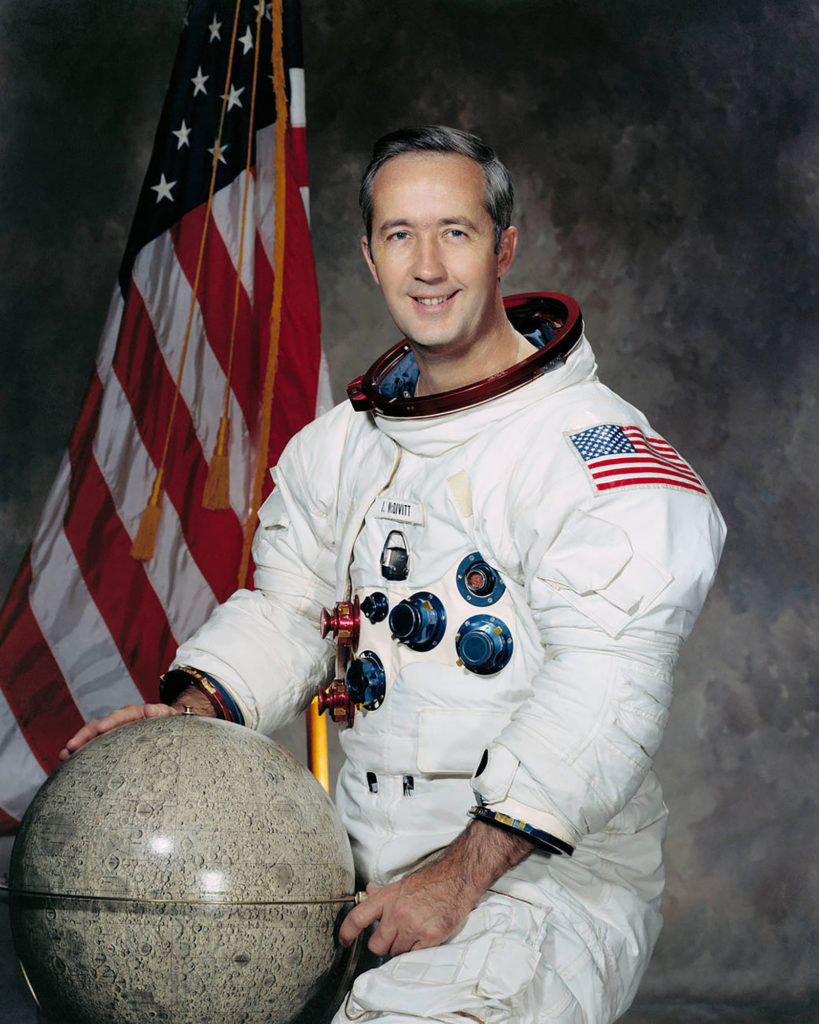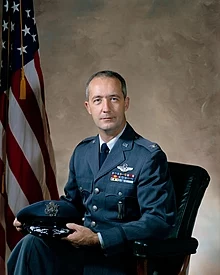Brig. Gen. James A. McDivitt, a fighter pilot in the Korean War and Air Force test pilot and astronaut in both the Gemini and Apollo program who later managed the Apollo lunar landing program and became a business executive, died Oct. 13 at the age of 93.
McDivitt’s 1969 Apollo 9 mission, the first test of all the vehicles and gear to be used in reaching the moon, paved the way for the Apollo 11 lunar landing four months later.
Born in Chicago, Ill. in 1929, McDivitt entered the Air Force as an aviation cadet in 1951 and earned his wings and commission a year later. He trained in the F-80 and in late 1952 was assigned to the Korean theater, where he flew 145 combat missions in the F-80 and F-86, twice receiving the Distinguished Flying Cross.
Returning to the U.S., McDivitt served at McGuire and Tyndall Air Force Bases as an interceptor pilot. In 1959, he was first in his class completing his undergraduate degree in aeronautical engineering through the University of Michigan and the Air Force Institute of Technology.
That same year, he applied to, and was accepted by, the Air Force test pilot school. He graduated from that course as well as the first class of the Aerospace Research Pilot School. He then worked on a number of developmental aircraft—including as a chase pilot on the X-15 program—and he was due to head the F-4 Phantom test program when in 1962 he was selected by NASA for the second group of astronauts.
McDivitt was assigned to command Gemini IV, the most ambitious U.S. spaceflight up to that point. He flew the four-day mission in 1966 with fellow astronaut Edward White; it was the first Gemini flight to be commanded by a space rookie. During the 66-orbit mission, White made the first spacewalk by an American, and the pair conducted a dozen other scientific and medical experiments, although an attempt to rendezvous with the Titan rocket’s spent upper stage did not succeed, due in part to NASA’s still nascent understanding or orbital rendezvous techniques. A computer failure forced McDivitt to improvise an unplanned and unrehearsed method of re-entry, all the while struggling with a stuck thruster, but the capsule made a safe landing just 50 miles from its target.
Three years later, McDivitt commanded the three-man Apollo 9—flying with lunar module pilot David Scott and command module pilot Russell Schweickart—which was the first space test of both the Apollo command/service module (CSM) and lunar landing vehicle, both together and separately.
The shakeout flight also marked the first transfer of crew from one spacecraft to another, and the second docking of two crewed spacecraft. McDivitt and Scott flew the lunar module 100 miles away from the CSM to test its handling and systems. Schweickart also tested the backpack to be worn on the moon, in a two-person spacewalk with Scott. McDivitt successfully re-docked with the CSM, jettisoned the lunar module as planned and made a safe return to earth.
The successful mission cleared the way for the Apollo 10 dress rehearsal of the moon landing in lunar orbit two months later, and the Apollo 11 landing just two months after that.
Although offered command of a later moon landing mission, McDivitt opted instead to become manager of lunar landing operations in the Apollo Spacecraft Office, and later head of the Apollo Spacecraft Program, responsible for planning Apollos 11-16 and overseeing a redesign of the lunar module to allow longer stays on the moon.
McDivitt stayed in the Air Force through his astronaut career, and was promoted to brigadier general in early 1972. A disagreement with NASA leaders on crew selection for Apollo 17 prompted McDivitt to resign from the program a few months later, however. He retired from NASA and the Air Force soon afterward, before the last Apollo moon mission at the end of that year.
Almost immediately, McDivitt took up the position of executive vice president of the Consumers Power Company in his home state of Michigan. Three years later, he joined the Pullman, Inc. railroad company as an executive vice president and director, and later that year became president of the Pullman Standard Division.
In 1981, McDivitt joined the Rockwell International aerospace company, as senior vice president for government operations and international. He worked at Rockwell for 14 years until his retirement in 1995.
Among his Air Force decorations, McDivitt received the Distinguished Service Medal, three awards of the Distinguished Flying Cross, four Air Medals and Air Force Astronaut wings. He also received the NASA Exceptional Service Medal. He was awarded honorary doctorates from Seton Hall University and Miami University of Ohio.
McDivitt was a member of the Society of Experimental Test Pilots, the American Institute of Aeronautics and Astronautics, the Tau Beta Pi engineering honors society, the Phi Kappa Phi honors society, and the Atlantic Council on Foreign Diplomacy. He logged more than 4,500 hours of flying time, with more than 3,500 in jet aircraft.

